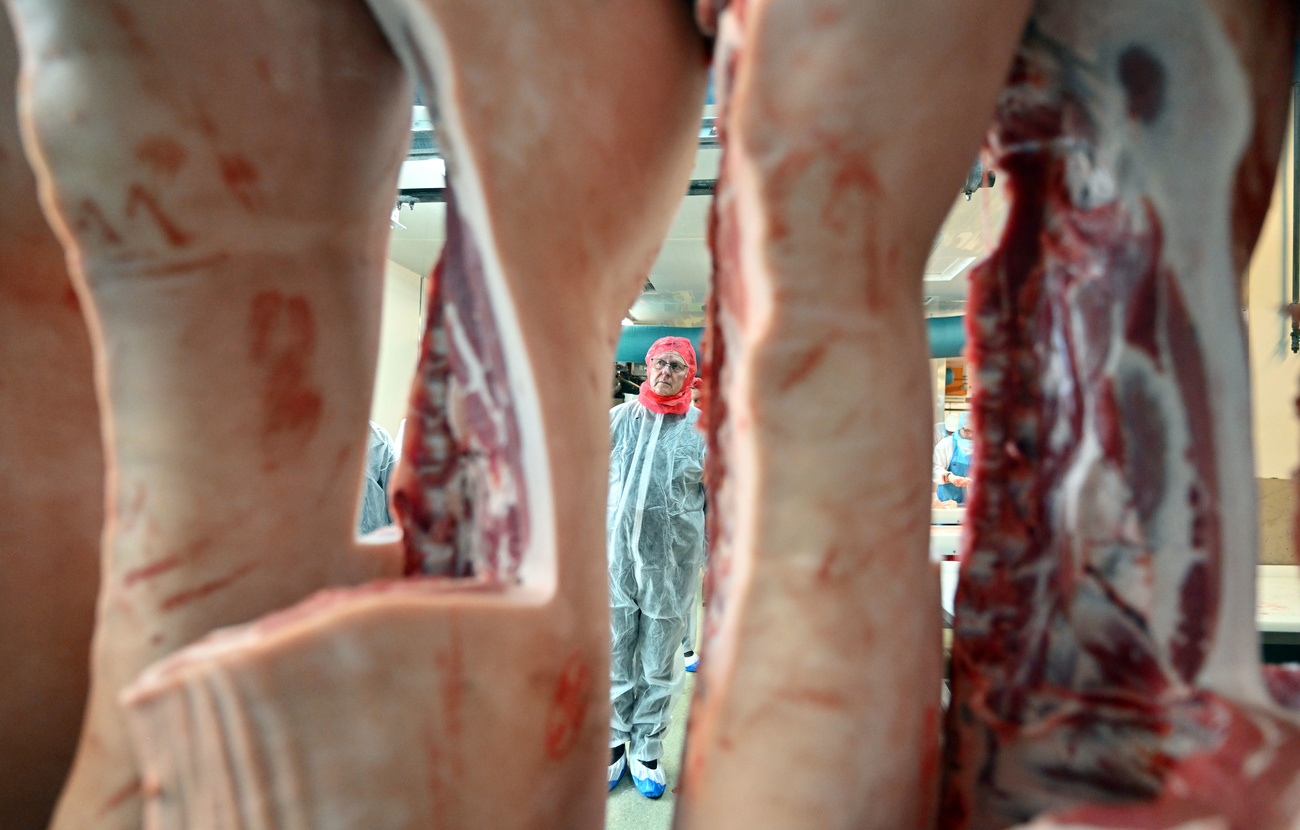
An investigation by Swiss public television, RTS, has put the spotlight on Switzerland's meat lobby and its attempts to influence climate policy by downplaying the role of livestock farming in global warming.
Who is the meat lobby?
At first glance, only two parliamentarians are directly linked to the industry’s two main umbrella organisations: Proviande, which represents major producers and distributors like Migros and Coop, and the Union Professionnelle Suisse de la Viande (Swiss Meat Trade Association), the political arm of the meat industry.
However, an investigation by Swiss public television, RTS, uncovered far more extensive connections. Based on publicly available data, a well-established network was revealed, linking 27 agricultural organisations and businesses, particularly those involved in meat production, with 16 members of parliament. Additionally, there are indirect ties to two other parliamentarians.
CHF10 billion in sales
“The meat industry is well represented in Bern,” says Mike Egger, a Swiss People’s Party parliamentarian from canton St Gallen, who is part of this network and also project manager at Micarna (Migros). “I don’t understand the demonisation of meat. It’s a very healthy food containing important nutrients. In Switzerland, agriculture, especially livestock farming, does an excellent job in terms of sustainability,” he argues.
The meat sector generates CHF10 billion ($12 billion) annually and provides employment for thousands. Egger is unhappy with the federal government’s new climate strategy, published in September 2023, which seeks to reduce meat production and encourages farmers to grow more plant proteins through direct payments.
“We’ll be reviewing and debating this strategy,” says Egger. “I’m confident it won’t have a big impact because, ultimately, we want productive agriculture. That’s what I’m determined to defend.”
The climate debate
The meat lobby has developed a hard-hitting communication strategy to play down the role of livestock farming in climate change and challenge the conclusions of international experts.
One example is a sponsored article in the Le Matin Dimanche newspaper, which stated that the Intergovernmental Panel on Climate Change (IPCC) “recently concluded that the current algorithm for calculating greenhouse gas emissions significantly overestimates global temperature trends”.
Valentine Python, a climatologist and former Green Party parliamentarian, describes this as disinformation. “They’re presenting completely erroneous and misleading facts,” she says.
“Not only is the IPCC being misquoted, but they are also being made to say the exact opposite of what they’ve claimed. This is scientific denial,” she adds.
$5 million invested
The Swiss Farmers’ Union (USP) released a video featuring American air quality expert Frank Mitloehner, aiming to downplay the role of livestock farming in global warming. However, Mitloehner is closely tied to the powerful American meat industry.
“Over $5 million (CHF4.2 million) has been invested by the meat industry in the Clear Center research facility created for him at the University of California,” notes Jennifer Jacquet, professor of environmental policy at the University of Miami. “What’s interesting is that he has no formal climate training, yet he talks about Earth’s cycles, emissions, and methane as though he’s a greenhouse gas expert. His aim is to defend the meat and dairy industries.”
So why does the USP feature this controversial expert? Michel Darbellay, a member of the USP executive, says: “I can’t comment on the funding of this professor or other issues. What I can say is that livestock farming and meat consumption are often unfairly stigmatised. We need to rely on scientific foundations to take responsibility.”
European projects put on hold
In Switzerland, Mitloehner’s colleague Peer Ederer, an agri-food consultant, questions the impact of livestock farming on global warming. Ederer co-authored the Dublin Declaration, an international appeal launched in 2022 to defend animal farming. “A minority of scientists have imposed their anti-meat positions,” Ederer claims.
“The majority of scientists don’t agree with them. The Dublin Declaration has given them a platform to express their views. In major political capitals, including Brussels, Berlin, and Washington, the ministries are aware of the declaration, which is a success.”
However, Camille Perrin, an agricultural policy expert at the European consumer organisation BEUC, argues that the Dublin Declaration “creates doubt about the consensus on the impacts of meat consumption and provides ammunition for politicians opposing ambitious environmental strategies”.
In Switzerland, it seems likely that the federal government’s climate strategy may face similar challenges in Parliament.
Translated from French with DeepL/amva
Full story here Are you the author? Previous post See more for Next postTags: Featured,newsletter
























